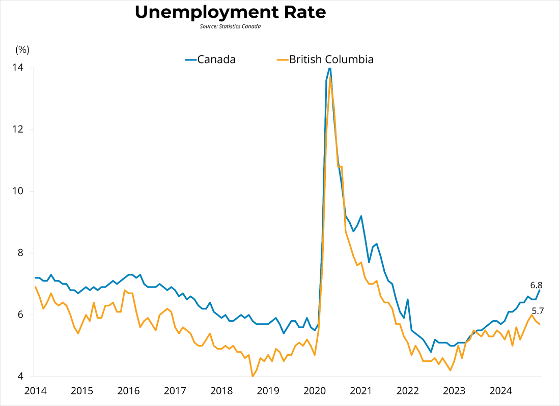Canadian employment rose by 0.2 per cent from the previous month, growing by 51,000 jobs to 20.647 million in November. The employment rate remained unchanged at 60.6 per cent, while the unemployment rate rose 0.3 points to 6.8 per cent. Average hourly wages rose 4.1 per cent year-over-year to $35.68 last month, while total hours worked were up 1.9 per cent from November of the previous year.
Employment in B.C. was largely unchanged, slightly rising to 2.830 million, with a gain of 1,400 jobs in November. Employment in Metro Vancouver fell 0.2 per cent to 1.603 million in November. The unemployment rate in B.C. fell by 0.1 points to 5.7 per cent in November. Meanwhile, Vancouver's unemployment rate rose by 0.1 points from last month to 6.3 per cent.
November's employment statistics are highlighted by the largest monthly increase in the unemployment rate since January 2017 (excluding 2020 and 2021 due to COVID). In addition, employment gains were largely driven by public sector growth (+1.0 per cent), while private sector employment remained relatively unchanged. Weaknesses in overall hiring activity, along with a sharp escalation in the unemployment rate, demonstrate that the Canadian labour market is cooler than the Bank of Canada had anticipated at this stage. Coupled with an underperforming quarterly GDP report last week, most signs point towards another jumbo cut by the Bank of Canada to close out 2024. As we move into the new year, the Bank hopes to reignite the economy and labour market through heightened consumer and business spending. 
For more information, please contact: Gino Pezzani.
Comments:
Post Your Comment: